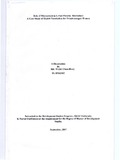| dc.contributor.advisor | Hakim, M. A. | |
| dc.contributor.author | Chowdhury, Md. Wohid | |
| dc.date.accessioned | 2010-09-27T03:57:15Z | |
| dc.date.available | 2010-09-27T03:57:15Z | |
| dc.date.copyright | 2007 | |
| dc.date.issued | 2007-09 | |
| dc.identifier.other | ID 05362007 | |
| dc.identifier.uri | http://hdl.handle.net/10361/239 | |
| dc.description | This dissertation is submitted in partial fulfillment of the requirements for the degree of Master of Development Studies, 2007. | en_US |
| dc.description | Cataloged from PDF version of dissertation. | |
| dc.description | Includes bibliographical references (page 60 - 62). | |
| dc.description.abstract | The study has been conducted in fulfillment of the partial requirement for the degree Master of Development Studies, BRAC Development Institute, BRAC University. The title of the study is Role of Microcredit in Urban Poverty Alleviation: A Case Study of Shakti Foundation for Disadvantaged Women. The major objective of the study is to know the impact of microcredit on urban poverty alleviation. The specific objectives are: to determine the existing mechanism of delivery of inputs under urban microcredit program (UMCP); to identify the existing microfinance services under the UMCP; to know about the other non- financial services provided under the UMCP; to assess about the socio-economic condition of the borrowers of UMCP; and recommend ways to enhance the poverty alleviation role of UMCP.
A total of 80 respondents-40 borrowers and 40 non-borrowers were selected randomly. The relevant information was collected using mainly questionnaire based survey.
The study finds that with using microcredit the urban poor women have undertaken different types of income generating activities (lGAs) and increased income. Now the borrowers are also able to save a portion of their income. This study also confirms that the borrowers’ have increased their household assets and improved housing conditions, and they can afford to pay for tap water, electricity, gas and medical treatment. The increase in their income has enabled the borrowers to participate in household decision making process and increase their mobility. This has led to the enhancement of the borrowers’ status in the society and rising up confidence for further improvement in their living condition. | en_US |
| dc.description.statementofresponsibility | Md. Wohid Chowdhury | |
| dc.format.extent | 80 pages | |
| dc.language.iso | en | en_US |
| dc.publisher | BRAC University | en_US |
| dc.rights | BRAC University dissertation are protected by copyright. They may be viewed from this source for any purpose, but reproduction or distribution in any format is prohibited without written permission. | |
| dc.subject | Developmental studies programs. | |
| dc.subject | Microcredit | |
| dc.subject | Poverty alleviation | |
| dc.subject | Urban poverty | |
| dc.title | Role of Microcredit in urban poverty alleviation: a case study of shakti foundation for disadvantaged women | en_US |
| dc.type | Dissertation | en_US |
| dc.contributor.department | BRAC Development Institute, BRAC University | |
| dc.description.degree | M. Development Studies | |

